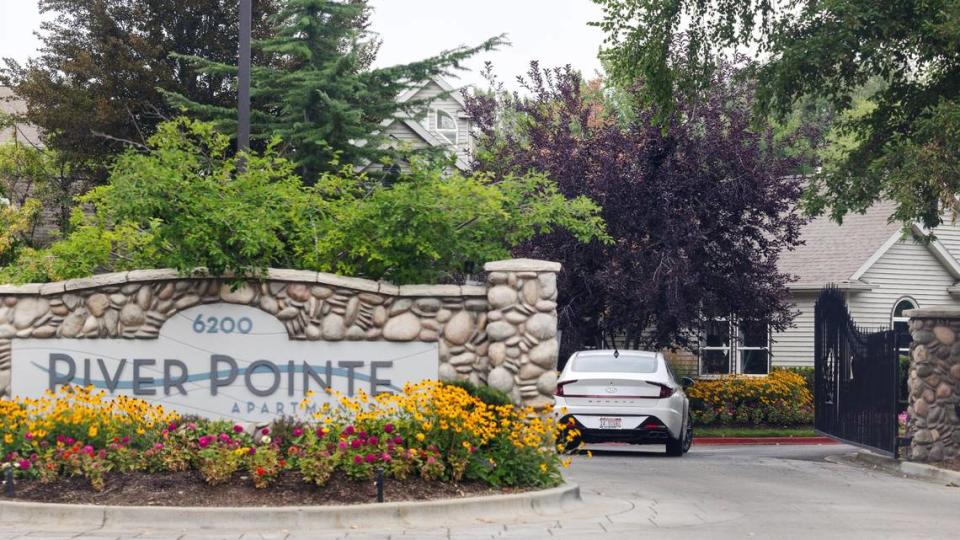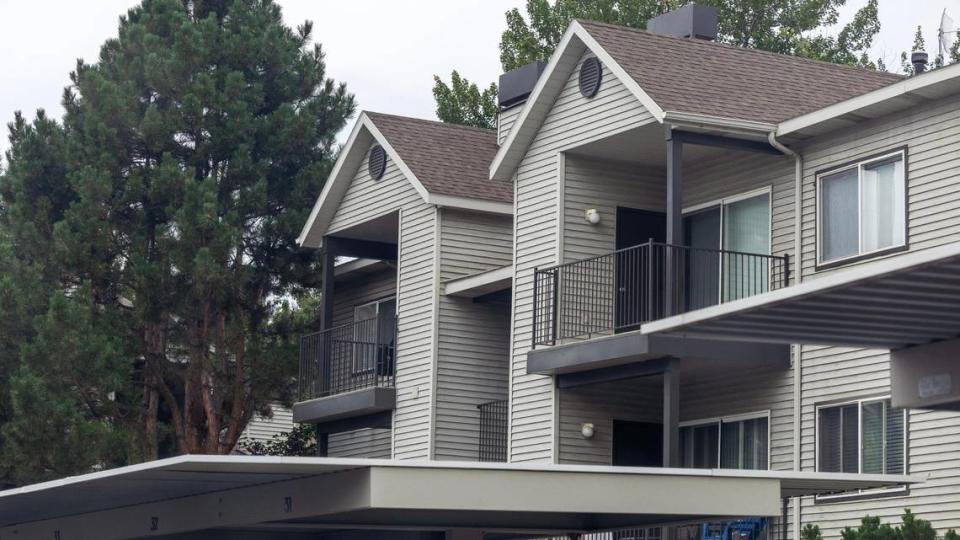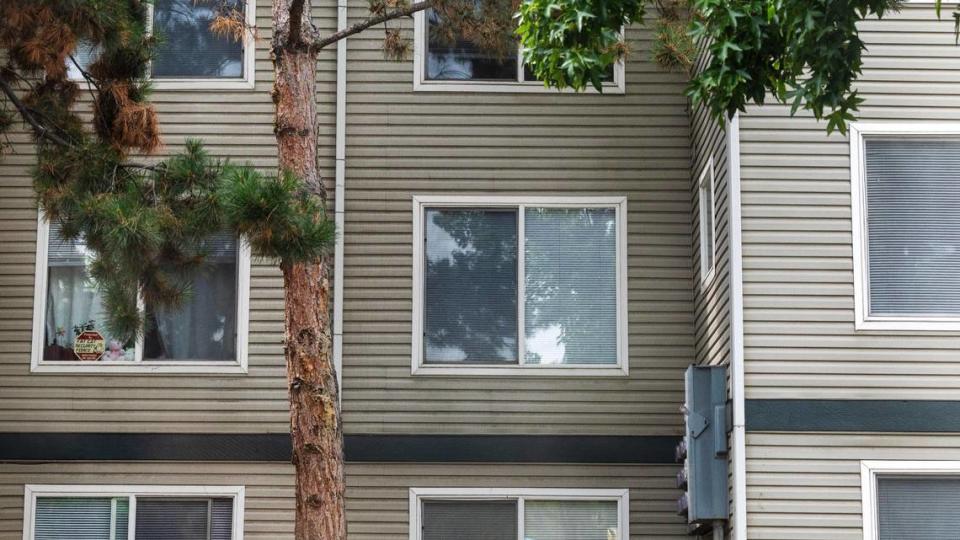Two Boise-area landlords are in charge of over 200 eviction filings. Here’s how they work
Katie McInally knows what it is like to get an eviction notice taped to her door. That is one reason she became a housing advocate, researcher and graduate student in the public administration program at Boise State University.
In the Treasure Valley, McInally, 35, isn’t alone. Hundreds of Valley residents confront eviction notices each year. Last year, at least 900 people faced eviction lawsuits from their landlords in Ada County alone, according to Idaho Supreme Court data obtained by the Idaho Statesman.
About 300 landlords and property managers sued those tenants. Two companies sued far more than any other, accounting for over 23% of the lawsuits: Table Rock and Kennedy Wilson.
Table Rock Residential, a Boise property-management business whose website says it manages 54 properties for their landlords in Ada County, sued tenants 112 times.
Kennedy Wilson, which owns eight multifamily properties in Ada County, according to its website, sued 92 times. The company serves an estimated 3,000 households in the Treasure Valley and uses third-party businesses to manage the properties.

After receiving a notice, a tenant must talk to the landlord or landlord’s representative, such as a property manager, and attempt to work something out, whether that is solving a lease violation or paying rent. The tenant has three days to resolve the issue and have the lease reinstated. If no resolution is reached, the landlord can sue to evict.
In Ada County, a tenant facing eviction must go through pretrial mediation after the lawsuit is filed. Ada County provides the tenant with a mediator for a fee. If mediation succeeds in reaching an agreement, a judge then accepts the deal, and the lawsuit is dropped. Most lawsuits are dropped, because either a resolution was reached or the tenant moved out.
Even just getting to the first step in the eviction process — having that piece of paper — is scary enough to cause some tenants to move out.
Informal evictions ‘extremely detrimental’
That is what happened to McInally 12 years ago. She was in her early 20s, renting her first apartment on her own in Boise. She was living paycheck to paycheck and got behind on her rent. That was when she received the eviction notice, which was a thick packet of paper that on the top, in “big bold letters,” said “Eviction Notice,” McInally said in an interview with the Statesman.
The first thing she thought was: “I have to move out. This is no longer my home,” she said.
This is how most evictions happen. They are called informal evictions, because they don’t go to court. They are hard to track, McInally said, but they happen more often than lawsuits, or the formal evictions.
When McInally received her notice, she called her mother and moved back to Garden Valley, 60 miles away.
“I had to drop out of school. I couldn’t work at my job anymore,” she said.
Nationally, studies have found that eviction or the threat of eviction leads to negative health outcomes for tenants. In a 2017 study published in the journal Social Science & Medicine, researchers from Spain and Chile reviewed studies from the U.S. and other countries. The authors found evidence that the threat of eviction can have negative mental health reactions.

A Harvard University Study from 2015 found that evictions have negative health effects on mothers and their children. Mothers who have been evicted were more likely to suffer from depression and stress. Stress can result from conflicts with landlords, the idea of going to court multiple times, and worries about whether the tenants will have a place to live.
“I am not saying at all that filing evictions is as bad as eviction final judgments, but it is extremely detrimental to mental and physical health and just overall well-being,” McInally said.
The Centers for Disease Control and Prevention says that housing insecurity can lead to tenants avoiding necessary doctor’s visits, and that people who struggle to pay their rent may be more likely to binge drink and smoke.
Table Rock did not respond to requests for comment via email, Facebook and a phone call through the front desk of an apartment complex it manages.
But Kennedy Wilson did. The company calls itself the largest owner of multifamily properties in the Treasure Valley, with nearly 3,000 living units. The company said it evicted fewer than 1% of its Ada County tenants in 2022.
In an email, Kennedy Wilson Managing Director Nicholas Bridges said the company makes “great efforts to retain each tenancy by providing multiple pathways for residents facing financial obstacles to remain in their homes, including guiding residents to secure rental assistance, establishing payment plans, and offering connections to outside resources to help residents avoid eviction.”
“On a local level, Kennedy Wilson supports several local nonprofit organizations, including LEAP Housing and CATCH in the Boise area, that promote housing stability and are key to local efforts to combat homelessness in the Treasure Valley,” Bridges said.
Boise-area rents contribute to eviction increases
Kennedy Wilson has boosted rents significantly at times in Boise. In 2015, after Kennedy Wilson acquired the Whitewater Park Apartments near Whittier Elementary School in the West End, the Statesman reported that the company raised rents in some cases by more than 50%. A one-bedroom apartment facing Quinn’s Pond increased from $777 to $1,176.
Big rent increases can force some tenants to move or leave them unable to pay the rent, prompting eviction notices. Most evictions happen because renters cannot or do not pay their rent, according to Eviction Lab, a national eviction database.
Rents increased sharply across the Treasure Valley for years until 2022. They’ve slipped since but remain elevated. The median rent for a two-bedroom Boise apartment in July was $1,327, according to Apartment List, a national listing service. That’s down 6.3% from July 2022 but still up 43% from $930 in July 2018.
One-bedroom median rents rose 56% in that five-year period, to $1,123 from $720.
And local rents were already on their path of ascent by 2018. The average one-bedroom Ada County living unit in 2015 rented for $606 a month, itself an increase of 30% since 2009, the Southwest Chapter of the National Association of Rental Property Managers reported at the time.
Kennedy Wilson did not reply to two follow-up emails asking what its rents are today. On Tuesday, Whitewater Park Apartments’ website listed a two-bedroom, one-bathroom apartment for $1,702. Reedhouse Apartments, near Warm Springs Golf Course, listed a one-bedroom, one-bathroom apartment for $1,559.
Rents are similar at some apartments Table Rock manages. Rent for a two-bedroom, two-bathroom unit in the Bowery Point Townhomes, near Five Mile Road and Fairview Avenue, was listed at $1,549. Two-bedroom, one-bathroom units in the Curtis Junction Apartments, on Boise’s Central Bench, ranged from $1,300 to $1,600.
Jesse Tree’s 2022 eviction report said the number of eviction filings in the Treasure Valley ”is rising along with rent prices.”

Eviction mediation could help tenants, landlords
Local organizations like Jesse Tree try to work with landlords to help mitigate eviction in the Treasure Valley.
According to the 2022 Eviction Report from Jesse Tree, landlords reported their most recent evictions cost them an average of $7,500 each in lost rent, attorney fees, necessary repairs and court fees.
“Preventing eviction is important for the economic and overall health of the Treasure Valley community,” the organization wrote.
One person living on the streets after an eviction can cost taxpayers up to $53,000 per year in public and emergency services, according to the report. Rehousing a family once it has lost housing can cost up to $12,000.
Jesse Tree estimated that the cost of eviction mediation through the Ada County court process is $2,000.
Overall, eviction filings are on the rise in the Boise area, according to Jesse Tree. There were 237 more evictions filed in Ada County last year than in 2021.
In August 2020, the federal government placed a moratorium on evictions due to the COVID-19 pandemic. From 2020 to 2021, eviction numbers were relatively stagnant in Ada County, according to Jesse Tree. When the moratorium was lifted, evictions rose.
But Jesse Tree intervention and eviction mediation is helping reduce the number of evictions that result in final judgments. The number of people formally evicted in Ada and Canyon counties in 2022 was 348, down 20 from the year before.
Canyon County ended its pretrial eviction mediation program in July to allow eviction hearings to be scheduled more efficiently. Tenants must find legal representation to fight eviction lawsuits or represent themselves.
McInally said eviction mediation is the best tool for tenants and landlords and said it prevents evictions. In research for her Boise State master’s program, she found that the average cost of an eviction to landlords nationwide is $3,500, including legal fees, court costs, financial damages, property damages and lost rent.
“I think that mediation would be cheaper to landlords than going through the eviction process,” she said.
Where to find help
A list of organizations that offer eviction mediation and low- or no-cost legal representation can be found at isb.idaho.gov/ilf/ivlp/legal-assistance/housing-resources. The organizations include:
Idaho Legal Aid, which has a housing advice line at 208-746-7541. It is open from 10 a.m. to noon and 2 to 4 p.m. Monday through Friday.
Housing Crisis Hotline by Our Path, 208-336-4663
Jesse Tree of Idaho, (208) 383-9486
In a fight with your landlord? These 4 changes are designed to help Boise tenants
Homelessness ‘taught us humility.’ How this Idaho family was able to buy a house

